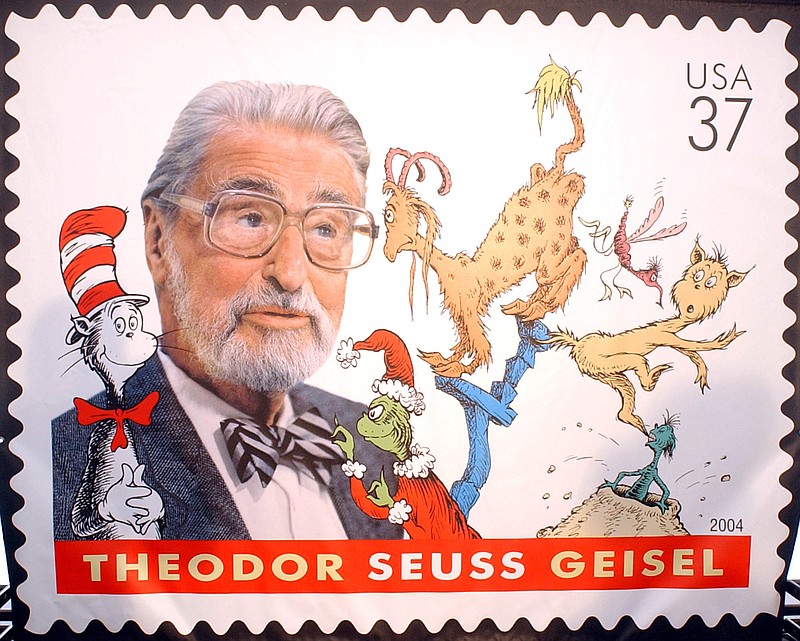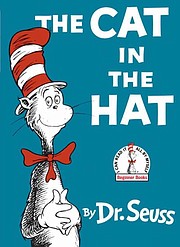Photo Gallery
Pat on the Back for 'Cat in the Hat': First classic by Dr. Seuss turns 60 — and still charms both kids and adults
"The sun did not shine, it was too wet to play,
so we sat in the house all that cold, cold wet day."
Cheryl Haynes remembers loving to read Dr. Seuss' "The Cat in the Hat" as a child and that love carried on into adulthood.
"I read it to my kids at school, who would dissolve into irresistibly contagious belly laughs," says the retired teacher. "We made construction paper Cat in the Hat hats to wear on Dr. Seuss' birthday. Fun times!"
And what is so appealing about the book? Well, it's obvious, she says.
"The silly rhyming and the Cat in the Hat!"
"The Cat in the Hat" celebrates its 60th birthday on Sunday, March 12. Three years after it was published, the story of the mischievous Cat and his partners in semi-crime Thing 1 and Thing 2 had sold more than 1 million copies. By 2007, its 50th birthday, the book had sold more than 10 million. In 2003, Mike Myers starred in a film version of the book.
Dr. Seuss - given name Theodor Seuss Geisel - died in 1991 after publishing more than 60 books that he also illustrated. They've sold more than 600 million copies worldwide and been translated into 20 languages.
"He was one of the first authors in America that wrote specifically for children's entertainment," says Kelly Coffelt, elementary school principal at Chattanooga School for the Arts and Sciences. "Sixty years later, children love to listen to words and rhymes."
And not just children.
"High schoolers love to hear Dr. Seuss," she says.
Even after growing into adulthood, some still love to read Dr. Seuss to their children or grandchildren - or even to themselves.
"I loved to read Dr. Seuss to my brother, who is 9 years younger than me," says Pam Lasecki Yarley. "He loved them, and it is always fun to read Dr. Seuss."
"The Cat in the Hat" came out the same year as Ken Martin, who recalls his parents reading it to him, a habit he's held onto and passed along by reading it to his kids. And now that he has a granddaughter, he's trying to instill a love of the book to her - or at least he's trying to.
"A new copy is at home and being read to my granddaughter - although she seems to like watching video better than being read to."
It wasn't just the words that Lea Hodges Harper enjoyed.

"I loved the pictures. I would look at those books for hours," she says.
Over the years, Geisel gave several different accounts on how "The Cat in the Hat" came about. At the core, though, he wanted to write a book that young readers would enjoy more - and find easier - than such series as the "Dick and Jane" books ("See Dick. See Dick run. Run, Dick, Run." Etc.) used in schools at that time.
Pulitzer Prize-winning author Louis Menand, who taught at Princeton, City University of New York and Harvard, credits "The Cat in the Hat" with permanently changing the way elementary schools teach reading.
" 'The Cat in the Hat' transformed the nature of primary education and the nature of children's books," Menand wrote in 2002. "It not only stood for the idea that reading ought to be taught by phonics; it also stood for the idea that language skills - and many other subjects - ought to be taught through illustrated storybooks, rather than primers and textbooks."
On Saturday, in honor of Geisel's birthday on March 2, the United Way of Greater Chattanooga held its annual Read Across Chattanooga event in the Center Court at Hamilton Place. Co-sponsored by Barnes & Noble, the event's logo includes an image of the famous hat of the Cat.
"I think the name of Dr. Seuss will always bring out people," says Katy Beth Barber, special events and marketing coordinator for the United Way of Greater Chattanooga.
Read Across Chattanooga generally attracts more than 500 attendees, she says. The first 500 always receive a free children's book, some of which are by Dr. Seuss, "and every single year we run out of books in the first 90 minutes," she says.
She remembers her parents reading "Oh, the Places You'll Go" and "Green Eggs and Ham" to her. The latter especially sticks out.
"I don't know how my parents read me that book," she says. "It goes on so long and so many things rhyme with 'ham'."
CSAS' Coffelt says the rhymes and simplicity of "The Cat in the Hat" make it a good choice for young readers to tackle themselves. And the fun way Geisel put words together makes it even better, she adds.
"It's repetitive, simple words that early readers can read," Coffelt says. "They love to listen to singsong rhythm of rhyming. It's pleasing to your ear. Even babies and toddlers love that."
And yes, she read Dr. Seuss as a child; "Fox In Socks" was a favorite because of its Tweetle Beetle Battle.
"When tweetle beetles fight, it's called a tweetle beetle battle.
And when they battle in a puddle, it's a tweetle beetle puddle battle.
And when tweetle beetles battle with paddles in a puddle,
they call it a tweetle beetle puddle paddle battle."
"That's the real tongue twister," Coffelt says. "I love to read it to kids because their jaws drop."
Contact Shawn Ryan at sryan@timesfreepress.com or 423-757-6327.

